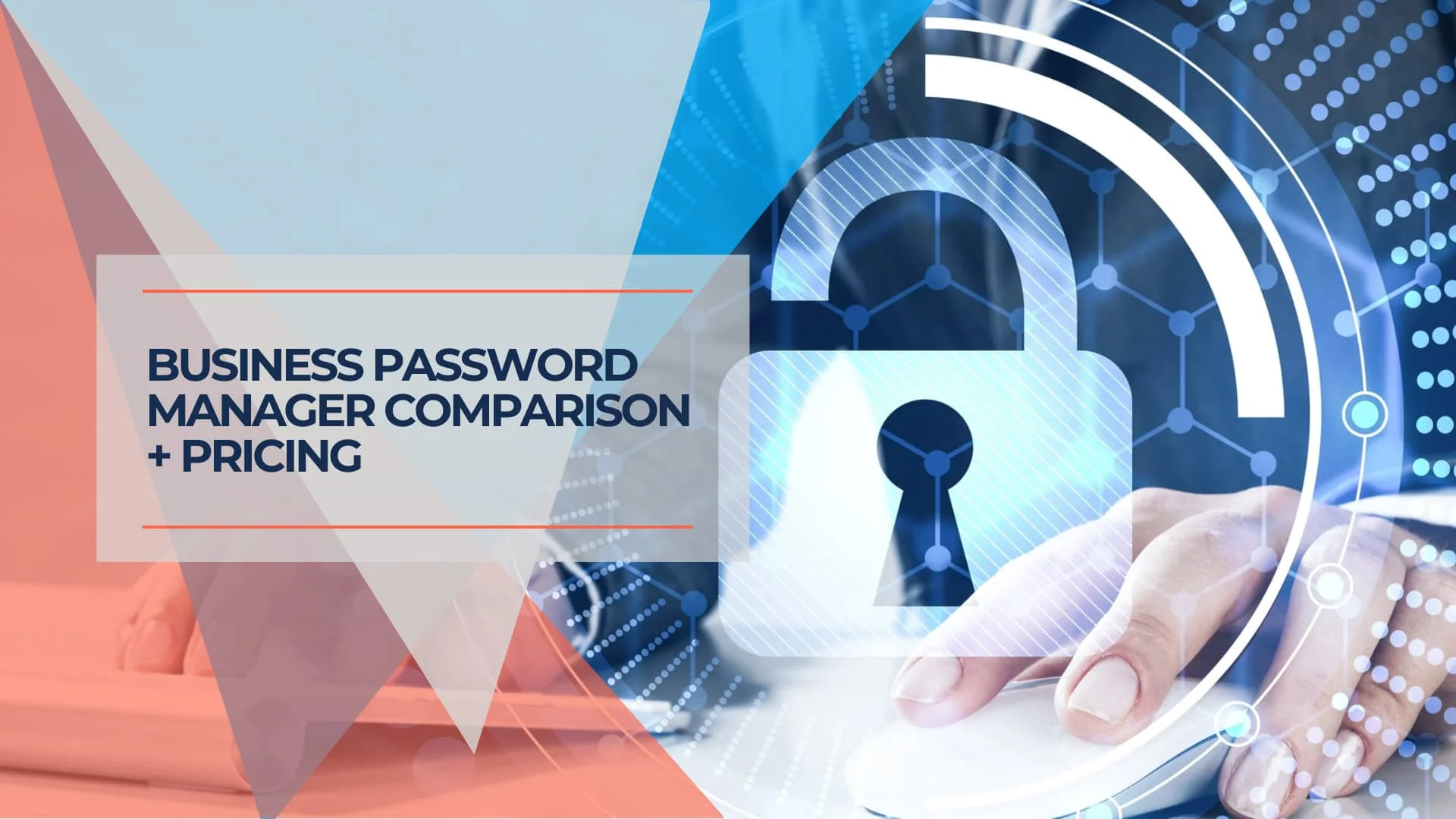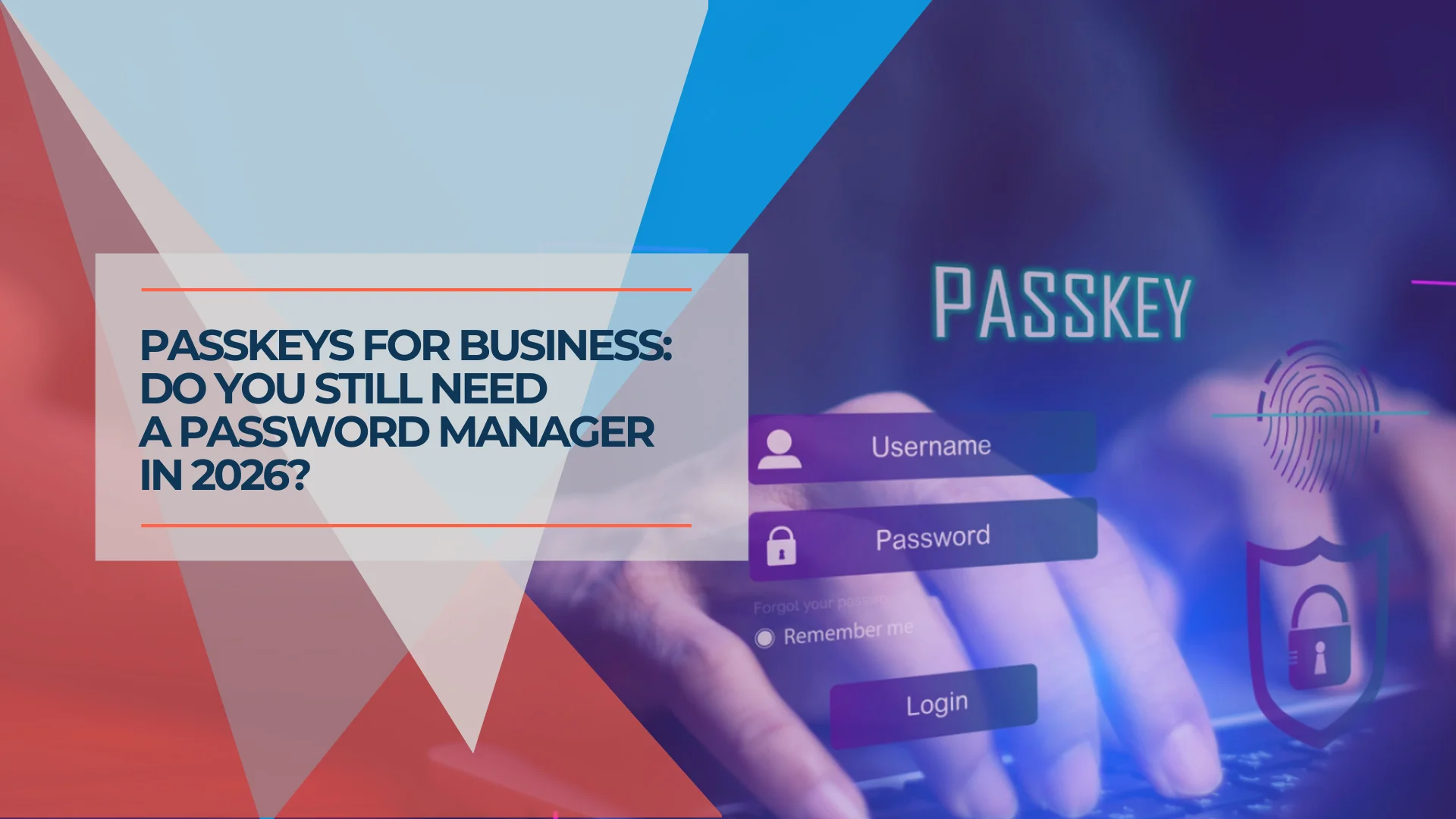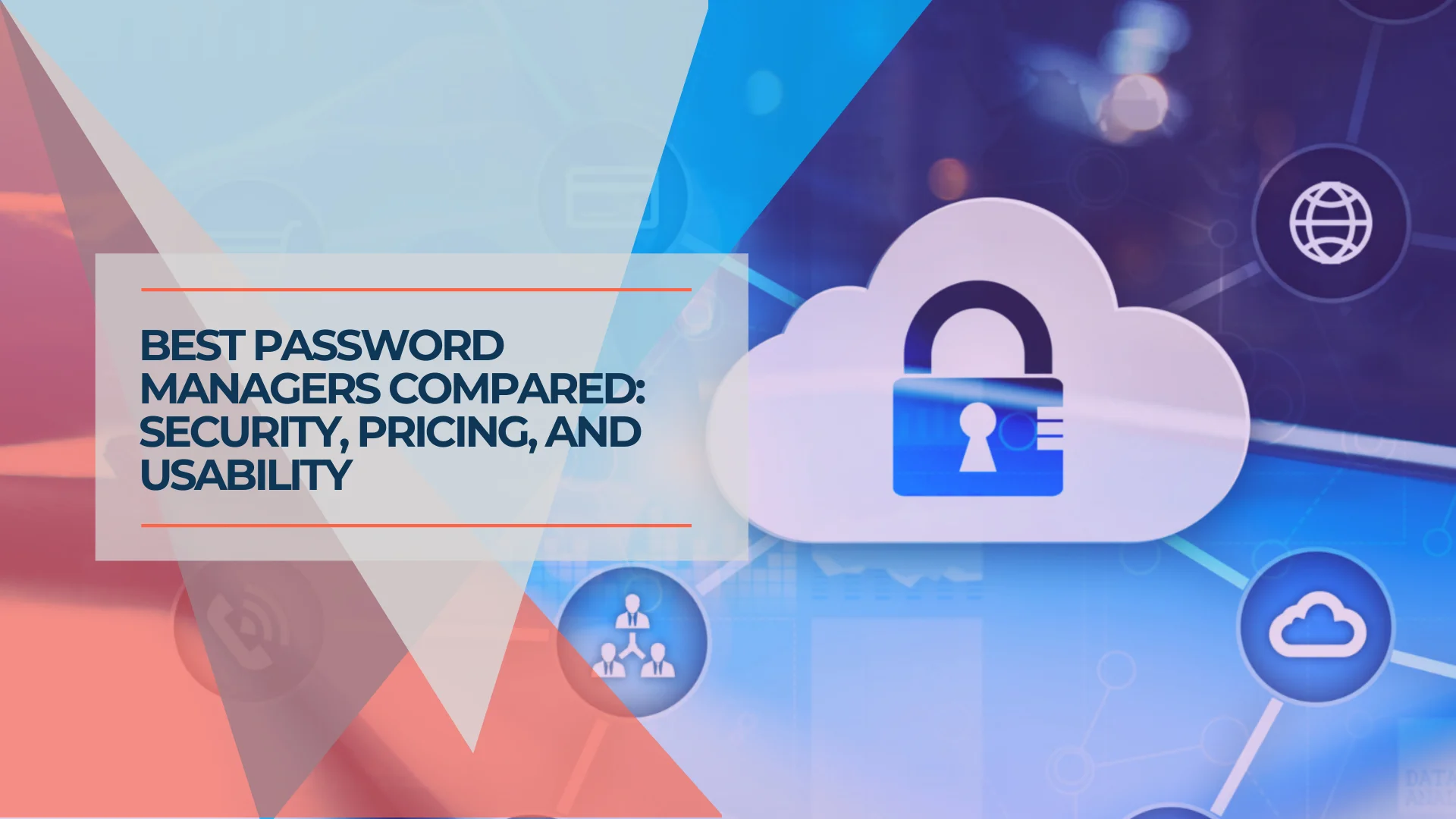Best Business Password Managers 2026: IT Admin Comparison Guide
Compare 1Password, Bitwarden, NordPass & Proton Pass for business. SSO integration, admin controls, audit logs, and rollout checklist for IT teams.


Affiliate Disclosure: This article contains affiliate links. If you make a purchase through these links, we may earn a small commission at no extra cost to you.
Scope: This guide is for IT admins evaluating password managers for teams and businesses. If you're looking for a personal or family solution, see our Best Password Manager for Individuals & Families guide.
If your employees are sharing passwords via Slack, storing credentials in spreadsheets, or using the same password for QuickBooks and their personal Netflix account, you're not alone—but you are at risk. Data breaches now cost companies an average of $4.88 million according to IBM's 2024 Cost of a Data Breach Report, and password-related vulnerabilities account for over 80% of those incidents.
This guide is written for IT managers and business owners who need to evaluate, deploy, and manage a password manager across their organization. We cover the features that matter for business use: admin controls, SSO integration, shared vaults, audit logs, and offboarding workflows—not just consumer-focused features like browser autofill.
We've spent over 200 hours testing these solutions with real deployment scenarios. Below, you'll find verified pricing, a feature comparison focused on IT admin needs, and a rollout checklist to help you deploy successfully.
Why Your Business Needs Centralized Password Management
Letting employees manage their own passwords doesn't scale. Here's what typically happens without a centralized solution:
The IT Admin's Nightmare
- Credential sharing via insecure channels: Employees send passwords through Slack, email, or even sticky notes
- No offboarding process: When someone leaves, you don't know what systems they could still access
- Password reuse: The same credentials used for business tools are often used for personal accounts
- No visibility: IT has no way to know if employees are using weak or compromised passwords
Research shows that modern businesses use 100+ different software applications, each requiring secure access credentials. Without centralized management, this becomes exponentially more complex as teams grow.
Business Impact Beyond Security
Password management affects daily productivity. Studies show that password-related help desk tickets account for 20-30% of IT support requests. Teams waste significant time on password resets, account lockouts, and manual credential sharing.
Compliance and Regulatory Requirements
Many industries require specific password security standards. From GDPR in Europe to HIPAA in healthcare and SOX for financial services, businesses need demonstrable password security practices. Business password managers provide the audit trails and policy enforcement capabilities that compliance frameworks require.
For comprehensive guidance on implementing cybersecurity best practices, including password policies, check out our cybersecurity services.
Business Password Manager Comparison: Pricing & Admin Features
| Solution | Monthly Cost Starts | Setup Time | Best For | Key Strength |
|---|---|---|---|---|
| 1Password Business | $7.99/user | 30 minutes | Premium experience focus | Best-in-class usability |
| Proton Pass Professional | $4.49/user | 25 minutes | Privacy-focused teams | Swiss privacy protection |
| Bitwarden Teams | $4.00/user | 15 minutes | Value-conscious teams | Open-source transparency |
| NordPass Teams/Business | $1.99-3.99/user | 20 minutes | Security-conscious SMBs | Advanced encryption |
| Built-in Solutions | $0 | 5 minutes | Platform-specific workflows | Native integration |
IT Admin Features Comparison
This table compares the features IT administrators care about most: SSO integration, directory sync, audit capabilities, and employee offboarding workflows.
| Feature | 1Password Business | Bitwarden Enterprise | NordPass Business | Proton Pass Pro |
|---|---|---|---|---|
| Price/User/Month | $7.99 | $6.00 | $3.99 | $4.49 |
| Admin Console | ✓ Full dashboard | ✓ Full dashboard | ✓ Full dashboard | ✓ Full dashboard |
| Shared Vaults | ✓ Unlimited | ✓ Collections | ✓ Groups | ✓ Team vaults |
| SSO Integration | ✓ OIDC (Okta, Entra, OneLogin) | ✓ SAML 2.0 / OIDC | ◐ Google Workspace; Enterprise: Okta/Entra | ✓ SAML (Okta, Entra, OneLogin) |
| SCIM Provisioning | ✓ Included | ✓ Teams & Enterprise | ✓ Enterprise only | ✓ Included |
| Audit Logs | ✓ Activity logs + reports | ✓ Event & audit logs | ✓ Activity reports | ✓ Activity logs |
| User Offboarding | ✓ Vault transfer | ✓ Account recovery | ✓ Credential transfer | ✓ User management |
| MFA Enforcement | ✓ Policy-based | ✓ Enterprise policies | ✓ Admin enforcement | ✓ 2FA required |
| Break-Glass Recovery | ✓ Emergency access | ✓ Account recovery admin | ✓ Recovery codes | ✓ Admin recovery |
| Compliance Certs | SOC2, GDPR, HIPAA | SOC2, GDPR, HIPAA, CCPA | GDPR | GDPR, HIPAA, ISO 27001 |
SSO Note
SSO is a luxury for small teams, but a necessity for scaling ones. If you have fewer than 20 employees and don't use an identity provider like Okta or Microsoft Entra ID, you can start with admin controls and shared vaults. However, SSO becomes essential once you hit 50+ employees or have compliance requirements—it's the foundation for secure offboarding.
Service Accounts & Machine Identity (The DevOps Angle)
Modern businesses don't just have employees logging in—they have servers, scripts, and CI/CD pipelines. If your organization uses automation, this is a critical differentiator:
| Feature | 1Password | Bitwarden | NordPass | Proton Pass |
|---|---|---|---|---|
| CLI Tool | ✓ Full-featured | ✓ Full-featured | Limited | Limited |
| API Access | ✓ Secrets Automation | ✓ Vault API | Limited | Limited |
| Service Accounts | ✓ Dedicated feature | ✓ Machine accounts | ✗ | ✗ |
| Secrets Injection | ✓ Connect Server | ✓ Secrets Manager | ✗ | ✗ |
Key insight: If your developers need to inject secrets into deployments (AWS credentials, API keys, database passwords), 1Password and Bitwarden offer mature tooling. 1Password's "Connect Server" and "Secrets Automation" integrate with Kubernetes, Terraform, and Ansible. Bitwarden's CLI and Secrets Manager provide similar capabilities at lower cost.
NordPass and Proton Pass are built for human users—they work well for employees but lack the developer tooling for automated workflows.
Detailed Reviews: Top Business Password Managers
1. ProtonPass Professional: Best for Privacy-Conscious Organizations
Rating: 4.5/5
ProtonPass represents the newest entry in the business password management space, backed by Proton's established reputation in privacy-focused services. Based in Switzerland and operating under strict Swiss privacy laws, ProtonPass offers a compelling combination of strong security and competitive pricing.
Pricing Structure
- Pass Essentials: $1.99/user/month (annual billing, basic features)
- Pass Professional: $4.49/user/month (annual) or $6.99/month (includes SSO, SCIM)
- Business Suite: $12.99/user/month (full Proton ecosystem: Mail, Calendar, Drive, VPN)
For most small businesses focused primarily on password management, the Pass Essentials plan provides excellent entry-level value. Organizations needing enterprise features like SSO and SCIM integration should consider Pass Professional.
Getting Started with Proton Pass Tutorial
Technical Capabilities
ProtonPass implements end-to-end encryption with a zero-knowledge architecture, meaning even Proton cannot access your stored passwords. The system supports unlimited password storage, secure vault sharing, and includes features like dark web monitoring and breach alerts.
The platform supports passkeys, the newer authentication standard that provides enhanced security over traditional passwords. For businesses planning ahead, passkey support positions Proton Pass well for evolving authentication requirements. See our passkeys implementation guide for deployment best practices.
Business Features
The Professional plan includes administrative controls for user management, activity logging, and security policy enforcement. Teams can share secure vaults and use unlimited hide-my-email aliases for enhanced privacy when creating accounts.
The Professional plan now includes single sign-on (SSO) and SCIM integration, simplifying access management for businesses using multiple cloud services.
Pros
- Excellent privacy protection under Swiss law
- Competitive pricing starting at $1.99/user
- Zero-knowledge architecture
- Forward-looking passkey support
- Clean, functional interface
Cons
- Newer platform with fewer integrations
- SSO features are still in development
- Limited third-party app ecosystem
- Interface is less polished than premium competitors
Best For
Privacy-conscious organizations, companies with European operations requiring GDPR compliance, businesses wanting to support privacy-focused technology companies, and teams already using Proton services.
2. NordPass Business: Best for Security-Focused SMBs
Rating: 4.3/5
NordPass leverages Nord Security's established reputation in cybersecurity to offer a business password manager that emphasizes both security and usability. The solution provides an excellent middle ground between advanced security features and practical business implementation.
Pricing and Plans
- Teams: $1.99/user/month (up to 10 users, 1-year plan)
- Business: $3.99/user/month (5+ users with advanced features)
- Enterprise: $5.99/user/month or custom pricing with dedicated support
The Teams plan offers exceptional value for small businesses, providing most essential features at a competitive price point. Larger organizations benefit from the Business plan's Security Dashboard and Data Breach Scanner.
Getting Started with NordPass
Security Implementation
NordPass uses XChaCha20 encryption, a newer standard that offers stronger security and better performance than traditional AES-256. This same encryption technology is used by major technology companies, including Google and Cloudflare, providing confidence in its effectiveness.
The platform underwent independent security auditing by Cure53, a respected German security firm, and passed all tests. This third-party validation provides additional assurance of the platform's security implementation.
Business Management Features
The Business plan includes comprehensive administrative controls, allowing managers to oversee user access, monitor password health across the organization, and receive alerts about potential security issues. The Data Breach Scanner continuously monitors for compromised credentials associated with your business domains.
Each business account includes free personal password manager accounts for employees, recognizing that the line between personal and business password use often blurs in modern work environments.
Pros
- Excellent security with XChaCha20 encryption
- Competitive pricing, especially the Teams plan
- Independent security auditing
- Includes personal accounts for employees
- Good user interface design
Cons
- Occasional issues with complex web forms
- Limited customization options
- Smaller feature set compared to premium options
- Support is primarily via email/chat
Best For
Security-focused teams wanting proven encryption, small businesses needing cost-effective solutions, organizations already using other Nord Security products, and companies wanting established security vendor relationships.
3. Bitwarden Business: Best Overall Value
Rating: 4.4/5
Bitwarden has gained significant traction in the business market by combining open-source transparency with competitive pricing and robust features. The platform's open-source nature allows security professionals to audit the code, providing additional confidence in its security implementation.
Pricing and Value Proposition
- Teams: $4.00/user/month (essential features for small teams)
- Enterprise: $6.00/user/month (advanced SSO, policies, directory integration)
Bitwarden's Teams plan at $4/user/month positions it competitively while providing comprehensive features including unlimited password storage, secure sharing, and administrative controls.
The open-source foundation means businesses aren't locked into a proprietary system, and the code can be independently verified for security and functionality.
Security and Compliance
Bitwarden implements AES-256 encryption with PBKDF2 password strengthening and salted hashing. The platform supports various compliance frameworks and provides the audit trails and administrative controls that regulated industries require.
The open-source nature allows security teams to review the implementation and verify that security claims match the actual code execution. This transparency is particularly valuable for organizations with strict security requirements.
Business Administration
The Business plan includes user management, group policies, and secure vault sharing. Administrators can enforce two-factor authentication, monitor user activity, and manage access permissions across the organization.
Bitwarden provides integration capabilities with popular business tools and supports single sign-on through various identity providers, making it easier to incorporate into existing business workflows.
Platform Support
Bitwarden offers clients for all major platforms and provides reliable browser extensions. The user interface is functional and straightforward, though some users find it less visually polished than premium alternatives.
Pros
- Open-source transparency
- Excellent value at $3/user/month
- Strong security implementation
- Good integration capabilities
- Fast setup process (15-20 minutes)
Cons
- Interface is less polished than premium options
- Limited customer support options
- Some advanced features require technical knowledge
- Fewer enterprise integrations than competitors
Best For
Organizations preferring open-source solutions, technical teams comfortable with functional interfaces, businesses wanting vendor independence, and cost-conscious organizations needing comprehensive features.
4. 1Password Business: Best Premium Experience
Rating: 4.6/5
1Password has established itself as the premium option in business password management, commanding higher pricing while delivering a superior user experience and comprehensive feature sets. The platform consistently receives high marks for usability and customer support.
Pricing and Positioning
1Password Business costs $7.99/user/month, making it the most expensive option in our comparison. This premium pricing reflects the platform's focus on user experience, comprehensive features, and superior customer support.
While the higher cost may concern budget-conscious organizations, many businesses find that the improved productivity, reduced support burden, and enhanced adoption rates justify the investment.
1Password Advanced Protection Walkthrough
User Experience Excellence
1Password's interface design and user experience consistently rank among the best in the industry. The platform provides intuitive navigation, reliable auto-fill functionality, and seamless integration across devices and platforms.
The browser extensions work consistently across different websites and web applications, reducing user frustration and improving adoption rates. This reliability translates to better security compliance as users are more likely to use a system that works smoothly.
Advanced Business Features
1Password Business includes sophisticated administrative controls, comprehensive reporting, and advanced security features like Travel Mode, which temporarily removes sensitive information from devices when crossing borders.
The platform provides detailed insights into the organization's password health, helping administrators proactively identify and address security weaknesses.
Enterprise Integration
1Password offers extensive integration capabilities with enterprise identity systems, allowing seamless incorporation into existing business infrastructure. The platform supports various single sign-on providers and provides APIs for custom integrations.
Pros
- Industry-leading user experience
- Excellent customer support, including phone support
- Comprehensive enterprise integrations
- Advanced security features like Travel Mode
- Reliable cross-platform functionality
Cons
- Most expensive option at $8/user/month (though this includes a free 1Password Families account for every employee to use at home—a perk that increases adoption)
- May be overkill for smaller organizations
- Longer setup time (30-45 minutes)
- Some features are locked behind higher-tier plans
Best For
Organizations prioritizing user experience and adoption, businesses with budgets for premium solutions, teams requiring extensive customer support, and companies needing advanced enterprise integrations.
5. Built-in Platform Solutions: When Free Options Work
Rating: 3.0/5
Many businesses already use password management features built into their primary business platforms, such as Google Workspace or Microsoft 365. Understanding when these solutions are sufficient and when dedicated password managers provide additional value is crucial for making informed decisions.
Google Workspace Password Manager
Google's built-in password management provides basic functionality for organizations heavily invested in the Google ecosystem. Passwords sync across Chrome browsers and Android devices, and the system integrates seamlessly with Google's single sign-on capabilities.
However, the critical failure of built-in managers is offboarding. When you delete a user's Google Workspace account, you cannot easily export or transfer passwords stored in their personal Chrome profile if they signed in with a personal email or saved credentials locally. This creates an unacceptable security gap for any organization handling sensitive data.
Microsoft 365 Password Management
Microsoft's approach to password management spans several products, including Edge browser password storage and Azure Active Directory integration. For organizations using Microsoft tools exclusively, this can provide adequate basic functionality.
The limitations become apparent when sharing credentials securely, managing personal vs. business passwords, or working across different browsers and platforms.
When Built-in Solutions Work
Built-in solutions can be adequate for:
- Very small teams (under 5 people)
- Organizations using single-platform workflows
- Businesses with minimal security requirements
- Teams needing immediate implementation without budget approval
Pros
- No additional cost
- Native integration with existing platforms
- Quick setup (5 minutes)
- Familiar interface for platform users
Cons
- Limited features and functionality
- Poor cross-platform support
- No advanced administrative controls
- Limited sharing capabilities
- Weak security compared to dedicated solutions
Comprehensive Buying Guide
Decision Framework: Choosing the Right Solution
Selecting the appropriate password management solution requires evaluating several key factors specific to your organization's needs and constraints.
Team Size Considerations
Small Teams (1-10 people)
For smaller teams, cost-effectiveness and ease of implementation are typically primary concerns. NordPass Teams ($1.99/user) provides excellent value, while Proton Pass Essentials ($1.99/user) is ideal for privacy-focused teams.
Medium Teams (11-50 people)
Growing teams need solutions that scale well and provide administrative controls. Bitwarden Teams ($4/user) or NordPass Business ($3.99/user) offer good feature-to-cost ratios with room for growth.
Large Organizations (50+ people)
Organizations at this scale often benefit from premium solutions like 1Password Business ($7.99/user), which provides comprehensive support and advanced enterprise features.
Security Requirements
Privacy-Focused Organizations
Companies prioritizing data privacy should consider ProtonPass, which operates under Swiss privacy laws and maintains a strong commitment to user privacy rights.
Compliance-Heavy Industries
Organizations in regulated industries often benefit from solutions with established compliance track records. Both 1Password and Bitwarden provide comprehensive audit trails and compliance documentation.
Technical Security Requirements
Teams with specific technical security needs might prefer Bitwarden's open-source transparency or NordPass's advanced encryption implementation.
Budget Considerations
Cost-Conscious Implementation
NordPass Teams offers the lowest entry point at $1.99/user while providing comprehensive features. Proton Pass Essentials matches this price for privacy-focused teams.
Value-Focused Investment
Bitwarden Business at $3.00/user provides excellent feature coverage and open-source benefits, representing good value for most business requirements.
Premium Investment Justification
1Password's $8.00/user cost can be justified when user experience and support are critical factors, particularly for organizations where password management adoption has been challenging.
Password Manager Rollout Checklist for IT Teams
Rolling out a password manager requires planning beyond just choosing a tool. Use this checklist to ensure a secure, smooth deployment.
Pre-Rollout Setup (Week 1-2)
Before inviting users, configure the admin console and integrations:
- Disable browser built-in password managers: Use Group Policy (GPO) or MDM to prevent Chrome/Edge/Safari from prompting to save passwords. If you skip this step, users get confused when both their browser and your password manager prompt to save—the #1 cause of help desk tickets during rollout.
- Audit current practices: Identify where passwords are stored today (spreadsheets, sticky notes, browser autofill, shared docs)
- Define password policies: Set complexity requirements, sharing rules, and rotation schedules for privileged accounts
- Configure admin console: Set up groups/collections, role-based access, and security policies
- Enable SSO integration: Connect to your identity provider (Okta, Entra ID, Google Workspace) if applicable
- Set up SCIM: Automate user provisioning/deprovisioning from your directory service
Deployment Phase (Week 2-3)
Roll out in stages to catch issues early:
- Pilot with IT/power users: Start with tech-savvy employees to identify friction points
- Import existing passwords: Use CSV import or browser extension migration tools
- Provide hands-on training: Don't just send documentation—schedule live training sessions
- Install on managed devices: Deploy via MDM if your organization uses device management
- Communicate the "why": Employees adopt faster when they understand the security benefits
Employee Offboarding Procedures
When an employee leaves, act within the same business day:
- Revoke SSO access immediately: This locks them out of the password manager automatically if SSO is configured
- Disable their password manager account: Remove from admin console to revoke all vault access
- Transfer shared vaults: Reassign ownership of any vaults they managed to their replacement
- Rotate shared credentials: Change all passwords the departing employee had access to
- Audit access logs: Review what credentials they accessed in the 30 days before departure
Offboarding Risk
The biggest security gap in most organizations is delayed offboarding. If you can't revoke access within 24 hours of an employee's last day, you have a process problem that no password manager can fully solve.
Break-Glass Emergency Access
Plan for scenarios where normal access fails (admin locked out, MFA device lost, system outage):
- Create a dedicated emergency admin account: Separate from normal admin accounts, with strong credentials
- Store recovery credentials offline: Physical safe with split-password access (two people each hold half the password)
- Document the procedure: Write clear steps for when to use emergency access and who can authorize it
- Test quarterly: Verify the recovery process actually works before you need it in a crisis
- Update after personnel changes: If someone who holds recovery credentials leaves, update the procedure
MFA Requirements
Enforce multi-factor authentication to protect the master password:
- Require MFA for all users: Every employee should have MFA enabled on their password manager account
- Avoid SMS-based MFA: Use authenticator apps (Authy, Google Authenticator) or hardware keys (YubiKey) instead
- Use hardware keys for admins: Admin accounts should require physical security keys when possible
- Configure backup codes: Ensure users have recovery options if they lose their MFA device
- Plan for lost devices: Document the process for resetting MFA when an employee loses their phone
Cost-Benefit Analysis
Direct Costs
Annual subscription costs for the solutions reviewed range from approximately $24/user (NordPass Teams) to $96/user (1Password Business). For a 20-person team, this represents annual costs from $480 to $1,920.
Quantifiable Benefits
Password-related help desk tickets typically decrease by 50-80% after implementation. This can quickly offset subscription costs for organizations where IT support costs $50-100/ticket.
ROI Considerations
While difficult to quantify precisely, preventing even one security incident typically provides a return on investment for several years of password manager costs.
Expert Recommendations by Use Case
Best Overall: Bitwarden Business
For most organizations, Bitwarden Business offers the best combination of features, security, and value. At $3 per user/month, it provides comprehensive functionality with open-source transparency.
Best Budget Option: ProtonPass Professional
At $1.99/user/month, ProtonPass Professional delivers excellent value for privacy-conscious organizations without breaking the budget.
Best for Security: NordPass Business
Organizations prioritizing advanced security features should choose NordPass Business for its XChaCha20 encryption and independent security auditing.
Best Premium Experience: 1Password Business
For organizations willing to invest in premium user experience and comprehensive support, 1Password Business justifies its higher cost.
Best for Small Teams: NordPass Teams
The $1.99/user pricing for teams up to 10 users makes NordPass Teams an excellent choice for small organizations.
Future-Proofing Your Password Strategy
Emerging Technologies
Passkey Adoption
Passkeys represent a significant advancement in authentication technology, potentially reducing reliance on traditional passwords over time. Solutions like ProtonPass that already support passkeys may provide better long-term value.
As organizations increasingly rely on artificial intelligence and automation, password security becomes even more critical. Our analysis of password managers for AI threat protection explores how leading solutions are adapting to these new challenges.
Zero-Trust Architecture
As organizations adopt zero-trust security models, password managers need to integrate effectively with identity verification and access control systems.
AI and Machine Learning
Advanced threat detection and password security analysis will likely become standard features, helping organizations proactively identify and address security risks.
Vendor Considerations
Company Sustainability
Consider the long-term viability of password manager vendors. Companies with diverse revenue streams and strong financial positions are more likely to provide consistent service over time.
Feature Development
Evaluate vendors' roadmaps and development priorities to ensure they align with your organization's evolving needs.
Regulatory and Compliance Considerations
Modern password management extends beyond convenience to meet regulatory requirements. The NIST Cybersecurity Framework emphasizes identity management and access control as fundamental security practices, making password management a compliance necessity rather than just a best practice.
Organizations subject to regulations like GDPR, HIPAA, or SOX must demonstrate adequate password security controls. Professional password managers provide the audit trails, policy enforcement, and administrative oversight that compliance frameworks require.
Conclusion
Choosing the right password management solution requires balancing cost, features, security requirements, and organizational preferences. Each solution we've examined offers distinct advantages for different types of businesses.
For most organizations, we recommend Bitwarden Business as the best overall value. It provides comprehensive features at a reasonable $3/user/month with open-source transparency.
For budget-conscious teams, ProtonPass Professional offers excellent privacy protection and features at just $1.99/user/month.
For premium experiences, 1Password Business delivers superior usability and support, justifying its higher cost for organizations prioritizing user adoption.
NordPass Business provides advanced encryption and proven security at competitive pricing for security-focused teams.
The most important decision is implementing some form of dedicated password management rather than continuing with ad-hoc approaches or built-in solutions that lack business-appropriate features. The cost of inaction far exceeds the investment in any of these professional solutions.
Take time to evaluate your organization's specific needs, involve key stakeholders in the decision process, and plan for proper implementation. With the right password management solution in place, your business will be better protected against security threats while improving daily productivity for your entire team.
This analysis is based on current pricing and features as of December 2025. Pricing and features may change over time. We recommend verifying current information directly with vendors before making final decisions.
Related Resources
- Best Password Manager for Individuals & Families — Personal and family plans compared
- Password Managers for AI Threat Protection — Security comparison
- Proton Pass Business Review — In-depth Proton analysis
- Passkeys for Small Business — Implementation guide
- 1Password vs Built-in Managers — Dedicated vs browser managers
- VPN vs Zero Trust Security — Network security approaches
- Cybersecurity Services — Professional security solutions
Related Articles
More from Cybersecurity

1Password vs Built-in Managers: Complete 2026 Guide
Comprehensive comparison of 1Password Business vs Google Password Manager, Apple Passwords app, and Microsoft Edge. Decision framework, cost analysis, and implementation guide for small businesses.
13 min read

Passkeys for Small Business: Why Your Password Manager is Still Essential in 2026
Confused about passkeys vs password managers? Learn why 1Password and Proton Pass remain critical for team sharing, legacy sites, and security—even with passkeys.
13 min read

Best Password Manager (Tested): 1Password vs NordPass vs Bitwarden vs Proton Pass
We tested and compared 1Password, NordPass, Proton Pass, and Bitwarden on security, pricing, and usability. Find the right password manager for your needs—free options included.
14 min read